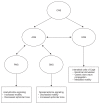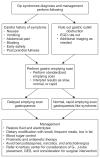Gastroparesis Updates on Pathogenesis and Management
- PMID: 28535580
- PMCID: PMC5593319
- DOI: 10.5009/gnl16336
Gastroparesis Updates on Pathogenesis and Management
Abstract
Gastroparesis (Gp) is a chronic disease that presents with clinical symptoms of early satiety, bloating, nausea, vomiting, and abdominal pain. Along with these symptoms, an objective finding of delayed gastric emptying, along with a documented absence of gastric outlet obstruction, are required for diagnosis. This article focuses on updates in the pathogenesis and management of Gp. Recent studies on full thickness biopsies of Gp patients have shed light on the complex interactions of the central, autonomic, and enteric nervous systems, which all play key roles in maintaining normal gut motility. The management of Gp has evolved beyond prokinetics and antiemetics with the use of gastric electrical stimulators (GES). In addition, this review aims to introduce the concept of gastroparesis-like syndrome (GLS). GLS helps groups of patients who have the cardinal symptoms of Gp but have a normal or rapid emptying test. Recent tests have shown that patients with Gp and GLS have similar pathophysiology, benefit greatly from GES placement, and likely should be treated in a similar manner.
Keywords: Enteric nervous system; Gastric emptying; Gastroparesis; Nausea; Vomiting.
Conflict of interest statement
Thomas Abell is a speaker and investigator for Medtronic, is an investigator for Theravance and has IP through the University of Mississippi, now licensed to ADEPT-GI, of which he is the founder. He is also an editor for MedStudy and a reviewer for UpToDate. Nanlong Liu has no conflicts of interest to disclose.
Figures




References
Publication types
MeSH terms
LinkOut - more resources
Full Text Sources
Other Literature Sources
Miscellaneous

